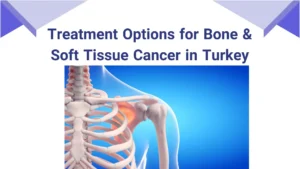A Comprehensive Guide to Cancer Treatment in Turkey for 2025
This guide provides a detailed look into the landscape of **Cancer Treatment in Turkey 2025** , offering essential information to help you make an informed decision and discover why Turkey has emerged as a leading destination for international patients seeking high-quality, affordable cancer care with cutting-edge technology and experienced medical professionals.

Navigating a cancer diagnosis can be an overwhelming experience, full of difficult decisions. When considering treatment options, many patients are now looking beyond their home countries in search of more accessible, innovative, and cost-effective care. In fact, Turkey has rapidly become a prominent global hub for medical tourism, particularly in the field of oncology. The country offers a compelling blend of advanced medical technology, internationally accredited hospitals, and highly skilled oncologists, all at a fraction of the cost found in many Western nations.
Furthermore, the healthcare sector in Turkey has undergone significant transformation, with substantial government and private investments leading to state-of-the-art medical infrastructure. This includes modern hospitals equipped with the latest diagnostic and therapeutic technologies. Many Turkish hospitals also hold prestigious international accreditations, such as those from the Joint Commission International (JCI), which serves as a testament to their commitment to world-class standards of patient safety and care. Therefore, an increasing number of international patients are choosing Turkey for their oncology needs.
Why Choose Turkey for Cancer Treatment?
The appeal of Turkey as a destination for cancer treatment is built on several key pillars. First and foremost is the cost-effectiveness. In fact, cancer care in Turkey can be up to 70% more affordable than in countries like the United States or the United Kingdom, without any compromise on quality. These savings can be significant, especially for treatments that require multiple sessions or long-term care.
In addition to the financial benefits, the country’s medical professionals are highly trained. Many Turkish oncologists and surgeons have received their education and training from prestigious universities globally. They are well-versed in the latest treatment protocols, following international guidelines from organizations like the NCCN and ESMO. For more information, you can find **oncologists in Turkey** on the Wmedtour website.
Moreover, Turkish hospitals have a strong focus on a multidisciplinary approach to cancer care. This means a team of specialists—including oncologists, surgeons, radiologists, pathologists, and nurses—collaborate closely to create a comprehensive and personalized treatment plan for each patient. This holistic approach ensures that every aspect of a patient’s condition is considered, ultimately leading to better outcomes and a more supportive experience.
Finally, Turkey’s strategic location makes it easily accessible for patients from Europe, Asia, and the Middle East, with well-connected airports and a simplified visa process for medical travelers. This accessibility reduces the stress and logistical challenges often associated with seeking treatment abroad.
Advanced Cancer Treatments Available
Turkish hospitals are at the forefront of modern oncology, offering a wide spectrum of advanced treatments that are on par with, or even exceed, those available in many developed nations. These include not only conventional methods but also cutting-edge therapies. For instance, immunotherapy and targeted therapy are widely available, offering more precise and less toxic alternatives to traditional chemotherapy. Similarly, the use of robotic surgery has become commonplace, leading to minimally invasive procedures with faster recovery times and reduced post-operative pain. This is particularly beneficial for complex surgeries related to breast cancer, gynecological, and gastrointestinal cancers.
In addition, advanced radiation therapy techniques such as Intensity-Modulated Radiation Therapy (IMRT) and Stereotactic Body Radiation Therapy (SBRT) are used to deliver highly precise radiation doses to tumors, while minimizing damage to surrounding healthy tissues. PET/CT scans and advanced genetic testing are also routinely used to provide an accurate diagnosis and tailor treatment plans based on a patient’s specific cancer type and genetic makeup. The availability of these advanced methods, combined with the expertise of the medical staff, solidifies Turkey’s reputation as a top-tier medical tourism destination for oncology patients. You can learn more about specific treatments on the **oncology department** page of the Wmedtour website.
Key Treatment Modalities
- Chemotherapy & Immunotherapy
- Radiation Therapy (IMRT, SBRT)
- Robotic and Laparoscopic Surgery
- Bone Marrow Transplantation (BMT)
- Targeted Therapy
Cost Comparison: Turkey vs. Other Nations
The cost of cancer treatment is a major factor for many patients and their families. While the exact cost varies depending on the type and stage of cancer, the specific treatment plan, and the hospital chosen, Turkey consistently offers a significant price advantage. For example, a full course of chemotherapy, which might cost upwards of $20,000 in the US or Europe, can be found for a much lower price in Turkey, often starting from a few thousand dollars per session. This affordability extends to surgeries, radiation therapy, and other specialized procedures. To illustrate this point, consider the following comparison table which includes a snapshot of costs in Turkey, Iran, and a Western country.
| Treatment Type | Estimated Cost in Turkey (USD) | Estimated Cost in Iran (USD) | Estimated Cost in a Western Country (e.g., USA) (USD) |
|---|---|---|---|
| Chemotherapy (per cycle) | $1,500 – $3,000 | $1,000 – $2,500 | $5,000 – $15,000+ |
| Radiation Therapy (full course) | $5,000 – $10,000 | $4,000 – $9,000 | $20,000 – $50,000+ |
| Robotic Surgery | $15,000 – $25,000 | $12,000 – $20,000 | $30,000 – $60,000+ |
| Bone Marrow Transplant | $30,000 – $60,000 | $25,000 – $50,000 | $100,000 – $250,000+ |
Note: The prices listed are estimates and can vary based on the specific hospital, patient’s condition, and type of treatment.
How to Start Your Journey: A Step-by-Step Guide
How to Arrange Cancer Treatment in Turkey
Arranging medical treatment abroad can seem daunting, but with the right guidance, the process can be seamless. Here is a simplified guide on how to get started. You can also see a list of accredited hospitals in Turkey for cancer treatment on the Wmedtour website.
Initial Consultation & Medical Records Review
Your first step is to contact a reputable medical tourism company like wmedtour.com. You will need to submit all your relevant medical documents, including reports, scans, and biopsies. The team will review your case and provide a free consultation with a specialist oncologist in Turkey. This is a crucial step for a preliminary diagnosis and treatment plan.
Receive a Personalized Treatment Plan
Following the review of your medical records, the Turkish medical team will prepare a detailed, personalized treatment plan. This plan will include the recommended treatment modalities, an estimated timeline, and a clear breakdown of the costs involved. This gives you a complete picture of what to expect.
Plan Your Medical Trip to Turkey
Once you approve the treatment plan, the medical tourism agency will assist with all the logistics of your journey. This includes arranging accommodation, airport transfers, and scheduling your appointments at the hospital. They can also provide assistance with visa applications if required.
Undergo Treatment & Recovery
Upon arrival, a patient assistant will accompany you to the hospital to ensure a smooth check-in. During your stay, the medical team will provide world-class care, and the agency will continue to offer support. The duration of your stay will depend on the treatment plan.
Follow-up & Post-Treatment Care
Your journey doesn’t end after you leave the hospital. The medical tourism agency and hospital will provide follow-up care instructions and arrangements for remote consultations if needed. This ensures continuity of care and a smooth transition back to your home country.
Outbound Links for Further Information
- For a general overview of cancer, visit the World Health Organization’s page on cancer.
- To understand cancer staging, refer to the National Cancer Institute’s guide.
- Learn about the latest research and clinical trials at Cancer Research UK.
- For details on the Joint Commission International’s accreditation process, visit the JCI website.
- To learn about cancer guidelines and research, visit the National Comprehensive Cancer Network (NCCN).
- For information on the prevention and treatment of cancer, explore the European Society for Medical Oncology (ESMO).
Frequently Asked Questions (FAQs)
Leading hospitals and doctors for cancer treatment in Turkey can be found by consulting with medical tourism agencies. It’s essential to look at the hospital’s accreditations, the doctor’s experience, and patient testimonials. You can find accredited hospitals in Turkey for cancer treatment on the Wmedtour website.
Turkish hospitals have expertise in a wide range of cancers. The most commonly treated include breast cancer, lung cancer, colorectal cancer, prostate cancer, and various hematological cancers. The multidisciplinary approach ensures comprehensive care for a variety of cancer types.
A medical tourism agency like wmedtour.com acts as a facilitator, helping international patients arrange their entire medical journey abroad. They assist with everything from initial consultations with specialists and organizing treatment plans to booking flights, accommodation, and providing in-country support. They are essential for a seamless and stress-free experience.
Absolutely. It is highly encouraged that you bring a family member or friend for emotional support. The medical tourism agency can arrange for their accommodation and travel as well, often at special rates. Having a companion can make the treatment process less stressful and more comfortable.
While the primary focus is on evidence-based, conventional cancer treatments, many hospitals in Turkey integrate supportive care and wellness programs to help patients manage side effects and improve their overall well-being. It is best to discuss your specific needs with your medical team to see what options are available.




